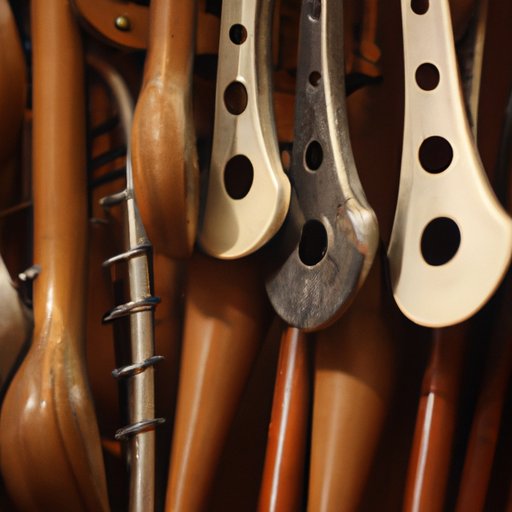Introduction
Music is a universal language that touches our hearts and souls in ways that nothing else can. It has the power to inspire us, make us happy, sad, or even relaxed. Learning an instrument is a fulfilling experience, but it’s not always easy. Some instruments require significant effort and dedication to learn, and not everyone has the ability to master them. In this article, we’ll take a closer look at the top 5 hardest instruments to learn, the science behind why they are challenging, and provide tips and suggestions for mastering them.
The Top 5 Hardest Instruments to Play: A Comprehensive List
Learning to play an instrument requires practice and dedication, but some instruments are inherently more difficult than others. Here are the top five:
1. Violin
The violin is considered one of the most challenging instruments to play due to its complex physical and technical requirements. Playing the violin requires excellent finger dexterity and precise bowing technique, and learning to play it can take years of practice. However, those who can master the violin can produce beautiful and emotionally moving music, as evidenced by world-renowned musicians like Itzhak Perlman and Joshua Bell.
2. French Horn
The French horn is another notoriously difficult instrument to play. It requires a high level of breath control and perfect embouchure, which is the manipulation of facial muscles to produce sound. Additionally, the horn has an intricate valve system that requires skillful playing, making it one of the most challenging instruments to master. Despite its difficulty, accomplished French horn players like Sarah Willis and Barry Tuckwell have showcased the beautiful and powerful music that it can produce.
3. Piano
Many people consider the piano one of the most accessible instruments, but it is also one of the most difficult to master. Playing the piano requires excellent finger strength, dexterity, and coordination, and requires a high level of mental processing since pianists have to read two different clefs simultaneously. Furthermore, pianists have to learn how to produce the right tone from the keys, which can be challenging. Despite its difficulties, pianists like Lang Lang and Martha Argerich have proven that mastering the piano can lead to some of the most beautiful music.
4. Oboe
The oboe is a challenging instrument to play due to its unique physical and technical requirements. To play the oboe, musicians must create a small vortex of air that vibrates through a small, double reed and produce an accurate and consistent pitch. Additionally, the oboe has a narrow range of sound, which requires skillful playing to produce beautiful music. Despite the challenges, renowned oboe players like Albrecht Mayer and Nicholas Daniel have used the instrument to create truly remarkable and emotionally moving music.
5. Harp
The harp is a delicate and intricate instrument that requires significant skill to play. It requires precise finger placement to produce sound and requires a high level of strength and dexterity to play. Furthermore, the harp is not a traditionally standardized instrument, so learning to play it can be quite difficult. Despite this, harpists like Park Stickney and Yolanda Kondonassis have mastered the instrument, and their music is a testimony to the beauty and complexity of the harp.
The Science Behind What Makes an Instrument Hard to Play
Playing an instrument requires several factors to come into play, including physical and mechanical aspects. Here are some examples:
Physiological Challenges
Playing an instrument is a complex physical activity that requires a high level of coordination between different parts of the body. For example, the violin requires precise finger placement, bowing technique, and accurate pitch control, requiring mental and physical endurance over long periods. Similarly, the oboe requires a particular mouth shape and control over breath that can be a challenge for some to manage consistently.
Mechanical Challenges
Instruments like the French horn or the clarinet have intricate valve systems that require skillful play to produce the correct notes, while the piano has a range of dynamics that require significant strength and stamina to produce the right sound through different phrases.
Uniqueness of the Instruments
Many of the most challenging instruments like the harp or the cello don’t fit the standard design of a regular instrument. Learning to play such instruments requires an exceptional level of skill and dexterity that takes years of practice and dedication.
Mastering the Hardest Instruments: A Beginner’s Guide
Mastering a hard instrument is a challenging feat, but it is not impossible. Here are some tips and suggestions for learning a difficult instrument:
Start with Basics
All great musicians start with basics, so it’s essential to start with a solid foundation. Understand how to hold the instrument properly, study basic notes, chords, and scales. Learning by covering these simple skills will give yourself the building blocks for more challenging practices.
Establish a Practice Schedule
Consistent practice is the key to mastering any instrument. Develop a regular practice schedule, depending on your available time, and practice diligently. Remember, even 15 minutes a day dedicated to your practice can be beneficial.
Find a Mentor or an Expert Teacher
Having an experienced teacher or mentor that can guide you through the more challenging aspects of learning an instrument can be an excellent way to learn. Finding a knowledgeable person that can teach you the basics can help you build your skills step by step.
Be Patient, Honest, and Don’t Give Up
Learning a difficult instrument takes time, effort, and patience. You may not see results overnight, but don’t let that discourage you. Keep practicing and remain honest with yourself and your progress. By aiming to improve yourself daily, you will achieve the results you seek over time.
Interview with an Expert: The Inside Scoop on Playing the Hardest Instruments
We had the opportunity to interview a professional harpist who shared some insights into playing difficult instruments.
What drew you to the harp, and what are some of the things that make it challenging?
“I was drawn to the harp’s unique sound and its visual beauty. Playing the harp requires an extraordinary level of coordination between different parts of the body, and it’s physically demanding. The harp produces a delicate and refined sound that requires mastering the quality of sound arching across large spans of strings.”
What advice would you give people who want to learn to play these instruments?
“Learning to play a difficult instrument requires time, dedication, and patience. Consistent practice is essential, and you should always push yourself to increase the difficulty of your play. Find a good teacher who can guide and mentor you through your learning process, and remember to enjoy the journey.”

Diving Deeper: The Psychological and Physical Challenges of Playing Difficult Instruments
Playing a difficult instrument requires not only physical abilities but also mental preparation and management. Here are some psychological and physical challenges to consider when learning a challenging instrument:
Frustration
Learning a challenging instrument takes time, and frustration is a natural by-product of progress. It’s essential to have patience and persevere even when faced with difficulties. Breaking down practice into small manageable chunks and focusing on each aspect at a time can help manage frustration.
Physical challenges
Playing challenging instruments can sometimes lead to bodily discomforts like pain or tension. Practicing regularly and actively understanding your body’s position when playing will help manage physical challenges effectively.
Mental Preparation
Playing difficult instruments requires significant mental preparation, especially during performances. Consider meditation, visualization techniques, or other mental preparation techniques that can help keep you focused and calm.
From Frustration to Success: Overcoming the Challenges of Learning the Hardest Instruments
To learn a difficult instrument, you must come to terms with the challenges and work through them. Remembering that playing music is a process and enjoying this process will help ease frustration. Here are some personal stories of successful musicians who have overcome the challenges of learning a challenging instrument:
Itzhak Perlman on the Violin
Itzhak Perlman began playing the violin at age four in his home country of Israel. Despite polio that gravely affected his mobility and put him in a wheelchair from a young age, he brilliantly mastered playing the violin, wowing his audiences worldwide with his emotional and inspiring performances.
Park Stickney on the Harp
Park Stickney began playing the harp at age ten under the guidance of his mother. Despite the challenges of playing a large instrument, he continued to master the harp throughout his career, taking on the unusual genre of harp jazz. With several recordings to his name, he is today the most popular and well-respected jazz harpist globally.
Breaking it Down: The Technique and Skill Required for Playing the Hardest Instruments
Playing a challenging instrument requires a combination of mental and physical discipline. Here is a detailed breakdown of the technique and skills required for each of the top 5 most challenging instruments:
Violin
Excellent finger dexterity, precise bowing technique, accurate intonation, and efficient vibrato control are essential technical requirements for playing the violin.
French Horn
Mastering the French horn requires perfect embouchure skill, seamless Slurs and having the power of producing a beautiful tone and dynamic range through the mouthpiece.
Piano
Playing the Piano requires finger strength and coordination, analytical skills and the ability to produce the right tone through a set of pedals.
Oboe
To master the Oboe, you need to have a unique mouth shape and control over breath, maintaining an even sound when playing long phrases.
Harp
Playing the harp requires finger position accuracy, independence, and synchronicity, maintaining a consistent and accurate pitch for smooth, beautiful sound.
Conclusion
Learning a difficult instrument takes time and patience, but the reward is well worth the effort. By keeping these tips and examples in mind, you’ll be well on your way to mastering the most challenging instruments. Remember to enjoy the journey and celebrate your progress.
